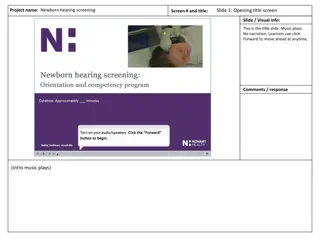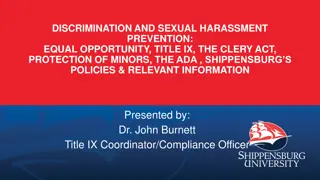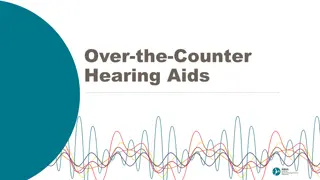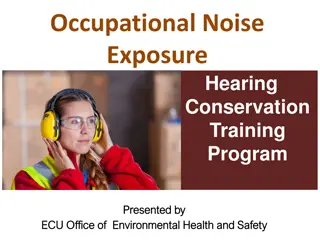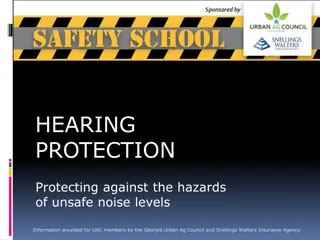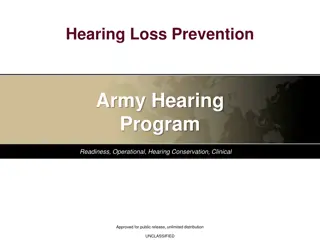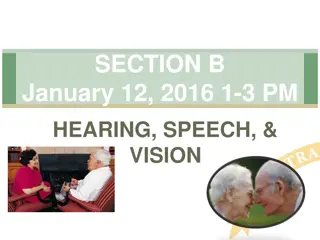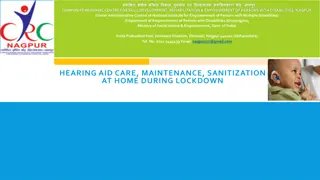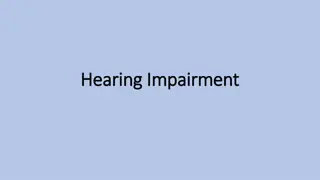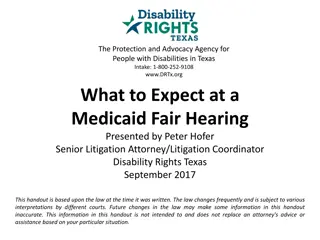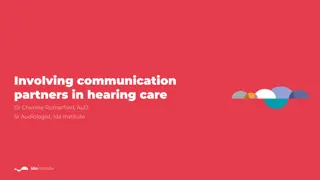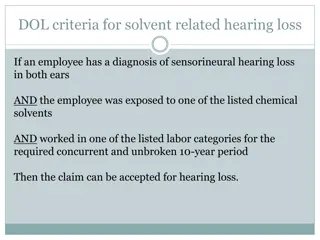Equal Opportunity and Title IX Hearing Panel Training
This comprehensive training session focuses on Equal Opportunity and Title IX hearing procedures, content knowledge, practice tips, and more. The agenda includes introductions, policy overviews, practice scenarios, and emphasizes confidentiality and policy understanding. Attendees are guided on handling sexual violence scenarios, understanding policies, and upholding confidentiality in the context of hearing panels.
Download Presentation

Please find below an Image/Link to download the presentation.
The content on the website is provided AS IS for your information and personal use only. It may not be sold, licensed, or shared on other websites without obtaining consent from the author. Download presentation by click this link. If you encounter any issues during the download, it is possible that the publisher has removed the file from their server.
E N D
Presentation Transcript
EQUAL OPPORTUNITY AND TITLE IX HEARING PANEL TRAINING
AGENDA: Introductions & Housekeeping Nondiscrimination Policy Overview Hearing Procedure Practice Tips Content Knowledge Questions and Close-out
CONTENT WARNING CONSENT, SEXUAL VIOLENCE SCENARIOS
INTRODUCTIONS Thank you for being here! Who do we have in the room? What brings you here? Kassandra Alberico, JD Title IX Coordinator kalberico@regis.edu (303)964-6435
HOUSEKEEPING TASKS Sign in! PowerPoint, handouts, etc. are in your email Ask questions as we go, time at the end for additional questions 2 year term at Coordinator s discretion. Terminate early for failure to attend training, inappropriate conduct on a panel.
EO AND TITLE IX POLICY OVERVIEW
POLICIES: READ CLOSELY Student Employee respondent: Non-Discrimination, Sexual Misconduct and Retaliation Policy | Regis University Sexual Misconduct Process and Procedures | Regis University Regis Student Handbook, page 11-42 Employee respondent Non-Discrimination, Sexual Misconduct and Retaliation Policy | Regis University Sexual Misconduct Process and Procedures | Regis University Amorous Relationship Policy Faculty respondent Non-Discrimination, Sexual Misconduct and Retaliation Policy | Regis University Sexual Misconduct Process and Procedures | Regis University Amorous Relationship Policy Faculty Handbook 5.6 Dismissal of Tenured Faculty 4.6.4
CONFIDENTIALITY The hearing process/what you learn when sitting on the Hearing Panel is entirely confidential. Please do not repeat names, facts, or outcomes of any hearing you partake in. This protects the privacy of all participants
CRIMINAL DEFINITIONS- COLORADO REVISED STATUTES Criminal Definitions Regis University Policy Definitions: The charges for sexual misconduct hearings come from the Regis Discrimination, Sexual Misconduct, and Retaliation Policy. The Policy is written in a way that is meant to provide clear definitions and should be read as written without inferring additional meaning. Below are possible charges and meanings. Coercion. Coercion occurs when an individual is pressured, psychologically or emotionally manipulated, tricked, threatened, or forced in a nonphysical way, to engage in unwanted sexual activity. Coercion occurs when an individual is caused to believe that sex is owed to another person because of that person s position of authority or based on the parties relationship. Coercion can involve persistent attempts to have sexual contact after an individual has already refused to engage in sexual activity. Nonconsensual Sexual Contact.An intentional act of sexual touching, however slight, with any body part or object by a person upon a person that is without consent and/or by force, or during a period of incapacitation that can be reasonably construed as being for the purposes of sexual arousal, gratification, or abuse. Nonconsensual Sexual Penetration.An act of sexual penetration (anal, oral, or genital), however slight with any body part or object, or, sexual intercourse by a person upon a person that is without consent and/or by force. Sexual Harassment. Conduct on the basis of sex that satisfies one or more of the following: An employee of Regis conditioning the provision of an aid, benefit, or service of the recipient on an individual s participation in unwanted sexual conduct; Unwelcome conduct determined by a reasonable person to be so severe, pervasive, and objectively offensive that it effectively denies a person equal access to the educational program or activity; or Sexual assault, dating violence, domestic violence, or stalking.
DEFINITIONS CONTINUED Sexual Exploitation. Refers to a situation in which a person takes nonconsensual or abusive sexual advantage of another, and that behavior does not otherwise fall within the definitions of Sexual Harassment, Nonconsensual Sexual Penetration or Nonconsensual Sexual Contact. Sexual exploitation includes, but is not limited to, sexual voyeurism, invasion of sexual privacy, taking and/or distributing pictures, video, or audio recording of a sexual act, or any other private activity without the consent of all involved in the activity, prostitution, exposing one s genitals in non-consensual circumstances, administering alcohol or drugs to another person without his or her knowledge or consent. Intimate Partner Violence. Intimate Partner Violence (IPV), often referred to as relationship violence, domestic, and dating violence includes any act of violence or threatened act of violence when used as a method of coercion, control, punishment, intimidation or revenge against a person with whom the individual was previously or is currently involved in a sexual, romantic, parenting or dating relationship. This includes relationships between spouses, former spouses, past or present unmarried couples, dating relationships and sexual partners. IPV includes, but is not limited to, physical violence, emotional abuse, financial abuse and other forms of sexual misconduct (stalking, nonconsensual sexual contact, nonconsensual sexual penetration and sexual exploitation). IPV includes threats, assault, property damage, violence or threat of violence to one s self, or to family, friends, coworkers or pets of the sexual or romantic partner. IPV may consist of one act of misconduct or an ongoing pattern of behavior. Stalking. Engaging in a course of conduct directed at a specific person that is unwelcome and would cause a reasonable person to feel fear or suffer emotional distress. Course of Conduct:Two or more acts, including, but not limited to, acts in which the stalker directly, indirectly, or through third parties, by any action, method, device, or means, follows, monitors, observes, surveils, threatens, or communicates to or about a person, or interferes with a person's property. Emotional distress:mental suffering or anguish that may, but does not necessarily, require medical or other professional treatment or counseling. Reasonable person:A reasonable person under similar circumstances and with similar identities to the complainant
DISCRIMINATION VS. HARASSMENT Discrimination: being denied/excluded participation in, or benefits of, any educational program or activity of the university based on protected status Protected statuses: race, color, gender, age, disability, veteran status, religion, national origin, sexual orientation, pregnancy Applies to: faculty, staff, administration, student body, visitors including guests, patrons, independent contractors, clients Examples: failure to get a raise, hire, train, promote, etc. based on protected status Harassment: Unwelcome and sufficiently severe or pervasive behavior based on protected status so as to substantially interfere with a person s work, education, participation in a University activity Protected statuses: same as discrimination PLUS gender identity Applies to: faculty, staff, administration, student body, visitors including guests, patrons, independent contractors, clients Examples: threats, physical contact, violence, pranks, jokes, derogatory comments, vandalism, or verbal, graphic, or written conduct
DEFINITIONS TO KNOW: REGIS POLICY, COLORADO & FEDERAL LAW TERMS TO KNOW HOW TO READ DEFINITIONS Sexual Harassment Sexual Violence Rape Sexual Assault Dating/Domestic Violence Fondling Incest Statutory Rape Stalking Consent See pages 32-38 of the Regis Student Handbook Regis policy rules When policy is unclear or silent, look to state law for clarification and further examples
CONSENT Colorado Revised Statutes Title 18 Criminal Code 18-3-401 defines consent, in reference to sexual activity, as cooperation in act or attitude pursuant to an exercise of free will and with knowledge of the nature of the act. Regis Policy defines consent as clear, knowing, voluntary, freely given, mutually understandable words or actions which indicate a willingness to participate in a mutually agreed upon, specific, act. Regis uses an affirmative consent standard when determining if there was consent to engage in sexual activity of any kind. Consent is defined as the affirmative, actively given, unambiguous and voluntary agreement to engage in a specific sexual activity during a sexual encounter. To obtain consent, a clear yes, verbal or otherwise, is necessary. Consent cannot be inferred from the absence of a no. Consent to one form of sexual activity does not imply consent to other forms of sexual activity A current or previous relationship shall not be sufficient to constitute consent. Consent can be withdrawn Consent may never be given by a minor under the age of 15, or by a minor under the age of 18 in certain situations depending on the ages of both parties and in instances where the adult is in a position of trust. Consent cannot be given by individuals who are asleep, or mentally or physically incapacitated either through the effect of drugs or alcohol or for any other reason. Submission under the influence of fear shall not constitute consent. Consent my not be given by an individual who is under duress, threat, coercion, or force. A person who initially consents to sexual activity is deemed not to have consented to any sexual activity that occurs after he or she withdraws consent. Consent to previous sexual activity does not imply consent to future sexual activity
CONSENT Under Colorado law, THERE IS NO CONSENT and a sex crime is committed if: o The victim is coerced by the immediate use or threatened use of force against a person or property o The victim is incapable of consent by reason of mental disorder, mental defect, drugs, alcohol, sleep or any other similar impairment of cognition and such condition is known or should have reasonably been known to the defendant Additionally, under Regis Policy there is NO CONSENT if The individual is coerced or pressured, psychologically or emotionally manipulated, tricked, threatened, or forced in a nonphysical way, to engage in unwanted sexual activity. Coercion occurs when an individual is caused to believe that sex is owed to another person because of that person s position of authority or based on the parties relationship. Coercion can involve persistent attempts to have sexual contact after an individual has already refused to engage in sexual activity. VIII 1 A individual is incapacitated, in a state where [they] lack the ability to make rational, reasonable decisions including an inability to understand the who, what, when, where, why or how of sexual activity, or an inability to fully understand the details of sexual interaction as a result of alcohol or drug consumption, illness, unconsciousness, blackout, sleep, mental disability, and other circumstances, and the Respondent knew or should reasonably have known the individual was mentally or physically incapacitated. VIII II An individual is forced to participate in sexual activity through the use of physical violence, abuse of power, threats, intimidation, and/or coercion in order to engage in sexual activity without a person s consent and against a person s will. VIII III
CONSENT A great deal of gray area exists We do require affirmative consent Consent must be drawn from the totality of the circumstances Can be verbal statements, physical reactions, texts, videos, crying, shaking of the head, etc. Failure to resist is not consent Consent may be for some of the conduct, but not all Consent may be withdrawn at any time
CONSENT Can come down to a credibility determination Your questions, if needed, are key Document your decision Consult with Title IX Coordinator
CONSENT: EXAMPLES CLEAR CONSENT DETERMINATIONS GREY AREAS Clear consent: Being asked to engage and answering with a clear, sober Yes! Nodding yes Inviting their partner(s) to engage Clear lack of consent No! Asleep Silence Drunk and vomiting Someone is drinking, stumbling, slurring their words, and obviously intoxicated, but otherwise holding conversations. When asked whether they want to have sex, the person gives a verbal yes to engage in sexual activity. A complainant reports they cant remember whether they consented, but the respondent reports they initiated the sexual contact
INTOXICATION/INCAPACITATION Goal today is not about making you an expert regarding intoxication or incapacitation There are no bright line rules except for unconsciousness due to consumption You must be able to identify evidence or evoke answers that suggest whether someone was more likely intoxicated or incapacitated Involves substances: Alcohol, illegal drugs, prescribed medication, or a combination of substances
INTOXICATION/INCAPACITATION Intoxication and Incapacitation are not the same As an example: intoxication can range to have some alcohol to can t drive per law, but may still be able to make decisions Regis Policy definition of INCAPACITATION: in a state where [they] lack the ability to make rational, reasonable decisions including an inability to understand the who, what, when, where, why or how of sexual activity, or an inability to fully understand the details of sexual interaction as a result of alcohol or drug consumption, illness, unconsciousness, blackout, sleep, mental disability, and other circumstances, and the Respondent knew or should reasonably have known the individual was mentally or physically incapacitated. VIII II
INTOXICATION/INCAPACITATION Why does intoxication matter? Can affect capacity to give consent Can affect recollection Can affect your assessment of witness credibility
INTOXICATION/INCAPACITATION As a board do you have enough to make a decision regarding intoxication and incapacitation one way or another? If you are not sure, communicate with the Title IX Coordinator. Indicia of intoxication: Slurred speech, off-balance when walking, glassy eyes, odor of alcohol from breath, coherence, demeanor, etc. Indicia of incapacitation: Unconscious, vomiting, unable to articulate coherent sentences, going in and out of consciousness, unable to walk, cannot stand, involuntary urination, etc.
INTOXICATION/INCAPACITATION Lots of gray Facts must be determined on a case by case basis You may consult with Title IX during a recess.
HEARING PROCEDURE
IMPLICIT BIAS Do you know any party member? Is there any reason at all that you cannot maintain a fair and impartial mindset while adjudicating this matter? Please recuse yourself when you feel you may have a bias in the outcome of the case.
HEARING IS CONVENED Complaint is filed and determined by the EO and Title IX Coordinator to POSSIBLY be a severe, persistent, pervasive violation of Regis s Nondiscrimination Policy IF EVERYTHING THE COMPLAINT STATES IS TRUE Title IX Coordinator will reach out to pool for (3) members Should conflict out if your participation could create the perception of a conflict of interest At least 5 days prior to hearing, the Date/time/location/allegations are set and messaged to the Panel/Respondent/Complainant Panel receives all previously submitted materials from all parties, including any additional evidence from the parties not captured in the investigation (at least 15 days prior to hearing) At least 10 days prior to scheduled hearing all parties, including advisors, will engage in a pre-hearing meeting with the Chair and Title IX Coordinator to review hearing protocol, deadlines for submission of witness lists/other materials, answer questions and receive investigative report/case materials Panel is expected to read, notate, and be prepared to ask questions about the materials in the hearing (questions will be compiled during recess and only the Chair will speak during proceedings).
HEARING PROCEDURE OVERVIEW Introductions Presentation of Information by the Complainant Directs/Cross of Complainant Witnesses Presentation of Information by the Respondent (Respondent is not required to testify and their choice not to do so should have no impact against them in the final determination). Presentation of Information by Witnesses Closing Statements - Hearings are private and closed to spectators -The Hearings, excluding deliberations, will be recorded by audio and video -Hearing Chair may limit the number of witnesses whose testimony may be redundant or not in dispute. -Witnesses must be identified and names must be disclosed to each party at least 5 days prior to hearing.
HEARING PROCEDURE: INTRO Introductions Members of the Campus Hearing Panel Title IX Coordinator University General Counsel Recitation of the alleged university policy violations Respondent states responsible or not responsible Overview of the flow of the hearing Reminder of specific rules Closed hearing (confidential) Expectation of truthful testimony Past sexual history is inadmissible Any question or line of questioning can be ruled inappropriate/irrelevant by the Chair will be refused for consideration and may be objected to by the opposing party (Chair makes determination as each question is asked). Standard is the preponderance of the evidence
LEGAL STANDARD OF PROOF BY A PREPONDERANCE OF THE EVIDENCE: To prove an element by a preponderance of the evidence simply means to prove that something is more likely than not. The greater weight of evidence, not necessarily established by the greater number of witnesses testifying to a fact but by evidence that has the most convincing force; superior evidentiary weight that, though not sufficient to free the mind wholly from all reasonable doubt, is still sufficient to incline a fair and impartial mind to one side of the issue rather than the other.
HEARING PROCEDURE: EVIDENCE Presentation of Information by the Complainant 20 min: Complainant presentation Panel questions for Complainant 15 min: Cross examination of Complainant from Respondent Presentation of Information by the Respondent 20 min: Respondent presentation Panel questions for Respondent 15 min: Cross examination of Respondent by Complainant
HEARING PROCEDURE: WITNESSES Presentation of Information by Witnesses 15 minutes TOTAL for all witnesses from one party (15 min for complainant s witnesses, 15 minutes for respondent s witnesses). No restriction: Board cross-examination of witnesses 10 minute cross-examination TOTAL for any adverse witnesses (ex. If two adverse witnesses, a party may spend 2 minutes crossing one party and 8 crossing the other, or any combination of time not to exceed 10 minutes across all witnesses.) Complete all complainant witnesses, board cross, and respondent cross, then all respondent witnesses, board cross, and complainant cross. Must be identified and names sent to each party at least 5 days prior to hearing.
HEARING PROCEDURE: CLOSING Closing Statements 10 minutes: Complainant closing 10 minutes: Respondent closing Chair closes hearing.
REACHING A DECISION Procedure: Hearing will be closed, all parties except Title IX Coordinator, General Counsel, and the Hearing Panel will be dismissed Discussions will be off the record Panel will evaluate the evidence What is the evidence that the policy was violated? What was the evidence that the policy was not violated? Does the evidence reach a preponderance? (50% plus a feather) Majority vote rules
SANCTIONS Panel decides the sanction Informed by previous practices gathered by HR and/or Title IX & Discrimination Complaint Coordinator Possible Sanctions include but are not limited to: Oral or written reprimand; Required attendance at a harassment/discrimination sensitivity program; Oral or written warning; Loss of salary or benefits or demotion; Transfer or change of job, class, residential assignment, or location, including removing the person from being in a position to retaliate or further harass or discriminate against the complainant; Suspension, probation, termination, dismissal, expulsion, or removal from campus; or Other action Regis University deems appropriate under the circumstances including termination of contractual arrangements with the University.
RELEVANCE TRAINING Advisors/Chairs must make objections/determinations as to whether the testimony offered is relevant Relevant questions must be appropriate for consideration and determination of whether it is more likely than not, or less likely than so that the alleged misconduct took place. Evidence is relevant if 1) it has any tendency to make a fact more or less probable than it would be without the information and 2) the fact is of consequence in the matter. Information is not relevant where: Related to the Reporting Party s sexual disposition or prior sexual behaviors (aka Rape Shield Law) unless: Offered to prove that someone other than the Respondent committed the alleged conduct, or Related to Reporting Party s prior sexual behavior with respect to Respondent and is offered to prove consent. Protected by a legally recognized privilege. Regis College will not require, allow, rely upon, or otherwise use questions or information that constitute, or seek disclosure of, information protected under a legally recognized privilege, unless the person holding such privilege has waived the privilege. Derived from a party s medical, psychological, or similar records, unless that party has provided prior written consent It is duplicative or repetitive
RELEVANCE SCENARIO TRAINING SCENARIO ONE: A case is being heard in which the Complainant testifies that the Respondent held the Complainant down by her neck during a sexual assault, cutting off her airway, and causing visible bruising to her throat. The Respondent takes the stand and says that, in previous sexual encounters with the Complainant, she asked him to choke her and it was a regular request in within their sexual relationship. Is the Respondent s testimony relevant? What follow up questions might be pertinent? Did she ask you to choke her during this occasion? Did she experience bruising during those other occasions?
SCENARIO TWO: A case is being heard in which the Complainant explains that he was raped in his dorm room by the Respondent. The Complainant offers physical evidence of redness, swelling, and lacerations to his anus which medical documentation suggest is consistent with rape. The Respondent takes the stand and testifies that the Complainant had sex with multiple partners that week and, for this reason, the injuries he sustained could have occurred in any one of those encounters. Is this evidence relevant? What follow up questions might be pertinent? What was the timeline between the Complainant s sexual encounter with the Respondent and their medical examination?
Scenario Three: A Respondent has been accused of raping the Complainant at a party. The Respondent wishes to offer Witness Testimony from three other women he s slept with, two before and one after the date in which the Complainant states she was raped. The Respondent claims that these three women will testify that he was extremely cautious about receiving consent before and during each sexual encounter. Is this evidence relevant? No. Whether or not the Respondent acted with caution and sought consent during other sexual encounters with different partners does not make the fact of consequence in this case (aka whether he sought consent from the Complainant) more or less probable. This is known as character evidence. Character evidence from individuals who did not witness the alleged violation take place is rarely relevant; however, character evidence should not be excluded as a default and a relevancy determination must be made. How much weight would you give this if it is deemed relevant?
INTERESTED CHAIRPERSONS, CONTACT ME Duties of the Chair: Runs the hearing: reads a script of the order of the hearing, collaborates with EO & Title IX Coordinator to run the hearing, vets questions, enforces time limits, leads discussion in closed session Communicates the decision outcome to EO and Title IX Coordinator Drafts the Outcome Letter Contact Kassandra Alberico at kalberico@regis.edu to express interest
PRACTICE TIPS OVERVIEW, NOTE TAKING, FRAMING THE QUESTION
PRACTICE TIPS As you review the report in preparation for the hearing, note the areas where questions arise for you Write out the questions and note who might have the information you need Work on framing your questions the art of language Inconsistent Statements good idea to anticipate them May not always have the witness testify; good to know who else might have the information you need
PRACTICE TIPS: NOTE TAKING Note-taking Suggestion: T-chart Write evidence favoring the complainant in one column, and favoring the respondent in the other column. You may have evidence from the same source in both columns Align evidence on the same points across from one another in the T-chart Note the source so you can revisit later if you still have questions When there s conflict, make a credibility determination to see who you believe
PRACTICE TIPS: FRAMING THE QUESTION Sometimes the questions have to be asked but do so with sensitivity Open-ended questions are good: let the witness tell you the story Can be specific Frame the question: when, where? Specific, open-ended, framed: I want to focus on the 10 minutes you were sitting on the couch. Instead of: What were you thinking? Try: I would really like to understand what was happening in that moment? Can you walk me through the thoughts running through your head, if you had any in that moment? What were you feeling?
PRACTICE TIPS: FRAMING THE QUESTION Why didn t you just leave? Why didn t you tell anyone right away? Why didn t you go to the police? Why didn t you tell him/her to stop? What were you wearing? Why were you drinking? Why did you leave the party with him/her? Gather the surrounding details What did you think was going to happen? Did you fight back? What happened next? How did you get home? Did you talk to anyone about it? Were you able to talk to the police? Gather the surrounding details Not relevant Were you drinking? (gather in the details) Gather the surrounding details Gather the surrounding details
DELIBERATION Deliberation: The Hearing Panel will determine whether or not the Respondent is responsible for the alleged violation(s), and if so, what Sanctions should be applied. In deliberating the outcomes, the Hearing Panel will make their decisions on facts presented based on a preponderance of evidence available for their review, including, but not limited to, all testimony from witnesses, written statements, and other relevant information. In evaluating conflicting testimony or statements, the Hearing Panel will determine, as they see fit, which versions of events are more credible
CONTENT KNOWLEDGE NEUROBIOLOGY OF TRAUMA, CREDIBILITY DETERMINATIONS
NEUROBIOLOGY OF TRAUMA How victim s record memory during an event Memory is impaired The emotional and sensory parts of the brain are responding Memory is fragmented, and difficult to retrieve (not stored in orderly chronological way)
DR. REBECCA CAMPBELL, NEUROBIOLOGY OF TRAUMA POST-IT NOTES
CREDIBILITY DETERMINATION Credibility determination means: who do you believe if there are conflicts in the recollections? Complainant (victim): when recollections are different, you believe the complainant Respondent (accused): when recollections are different, you believe the respondent Both: when recollections are different, you are unable to make a determination. You can still make a finding based on admitted facts from both parties. Neither: when recollections are different, you are unable to make a determination. You can still make a finding based on admitted facts from both parties. Think: how do I rectify conflicts? Keep in mind neurobiology of trauma, possible intoxication
QUESTIONS? Thank you for your service to Regis and our campus community!! Additional questions may be directed to kalberico@regis.edu or 303-964-6435


